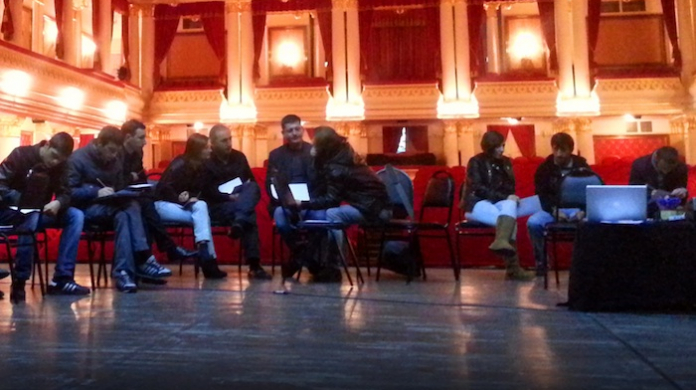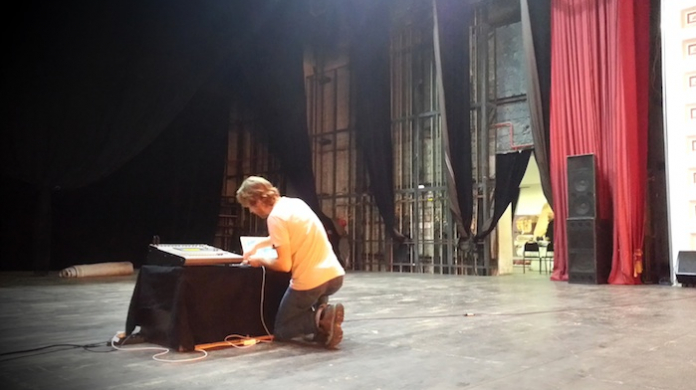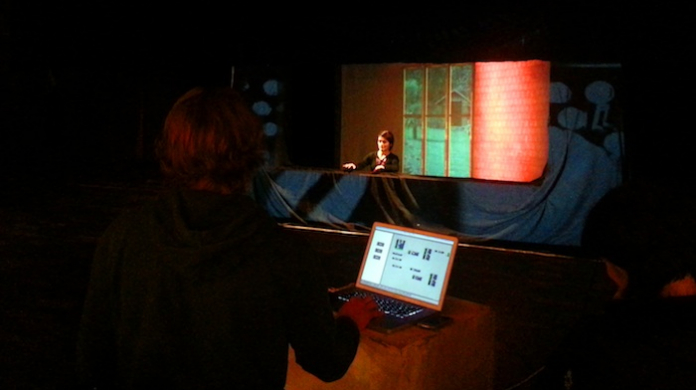The last week of November saw my company, imitating the dog, return to Georgia to deliver a two-day workshop to a mixed group of students, young artists, media professionals and theatre technicians. It was a very last-minute affair, but nonetheless an immensely rewarding and positive one. With the travel and logistics only confirmed on the Thursday before we were to fly on the Monday we really hit the ground running and had a whirlwind five day trip.
We first visited Georgia with the British Council in 2010 when we took our show Hotel Methuselah on a regional tour of the area, stopping off in Yerevan, Baku and Tbilisi. The company completely fell in love with Tbilisi (as usual the reasons were little to do with art and more to do with the incredible food we’d experienced or the amazing flea market we’d found) and, aside from a few technical teething problems, the show was a real success. This time we were only to be in Tbilisi for a matter of hours before heading off by road for the Black Sea resort of Batumi.
Eight hours in a van witnessing some, shall we say, ‘colourful’ driving, a stop off for some brilliant Georgian food and we were in the neon-coloured glow of Batumi, a stark contrast to the countryside we’d passed through. We were immediately into work, meeting the workshop participants in the theatre and trying to introduce our ideas and work in the theatre bar, including Pete Brooks grappling some pretty complex ideas about cinema and the joy we take in failing to recreate it on stage. We can only thank our interpreter for doing her best to keep up.
Titled Sound & Vision, the workshop introduced the notion of the soundtrack being not only central to the work we produce but possibly at the leading edge of it, informing and shaping the work before the narrative is developed. We had been asked to devise the workshop in response to Georgian delegates seeing our work The Zero Hour in the British Council Edinburgh Showcase this year. The show is made of lots of short scenes in many different locations. The placing of these scenes is aided by video backdrops but the soundtrack is key to both the sense of location and the filmic nature of the work. The piece is woven together like a film – edit, scene, cut, montage, edit – and the soundtrack is vital in the creation of this work. This approach, with the soundtrack used as it may be in a film or dance piece, is a relatively fresh approach in Georgian theatres and we used our two days to try and spark ideas, or an interest in the process. We certainly weren’t there to teach a technology. We were there to try and suggest a process, or an approach.
Participants were initially given a pre-made modular soundtrack which we had put together on our road trip the day before the workshop began (using Reaper as it’s widely available and, most importantly, cheap!) and asked to describe the show they could hear. They were then asked to rearrange, edit and add to it in order to create an aural narrative for a show of their own. This sound layer was then fed into a typical Imitating the Dog rehearsal process, combining video backdrops and live action to recreate, re-appropriate or reimagine classic cinematic techniques: the overhead, tracking or panning shot, cutaways or establishing shots. As Pete had tried to explain on the initial day, our work is at its most interesting when it tries, but fails, to re-present a re-creation of the real; when it re-stages what we understand to be a cinematic representation of life. In an afternoon we tried to present the methodology behind this process which we have developed over the past eight years! Lots of fun…
The day’s work was inspiring, with the participants entering into the process with passion and intrigue. Ideas, arguments and debates filled the rooms (our English reserve questioning if they had genuinely fallen out!) and it felt as though we were showing a genuinely fresh and interesting way of creating theatre, of piecing together a performance. The workshop was about process and it felt at the end of the session that we’d managed to ignite ideas in the participants with many wanting to take away software or files so they could continue the work in the future.
As ever, at least half of the value of this exchange came in the spaces between the “teaching”. In the breaks or the discussions after the workshop, on the road or in the bar. It continues to be one of the most fulfilling and valuable parts of being in this company.
We hope to return to Georgia next year to develop projects discussed during our trip and to try and re-engage with some of the ideas we touched upon. 2014 is a busy year for the company with a brand new production, UK tour and many projects with other companies and theatres but we’re hopeful that our relationship with the theatres in Batumi and Tbilisi will flourish over the next 12 months. Watch this space…


